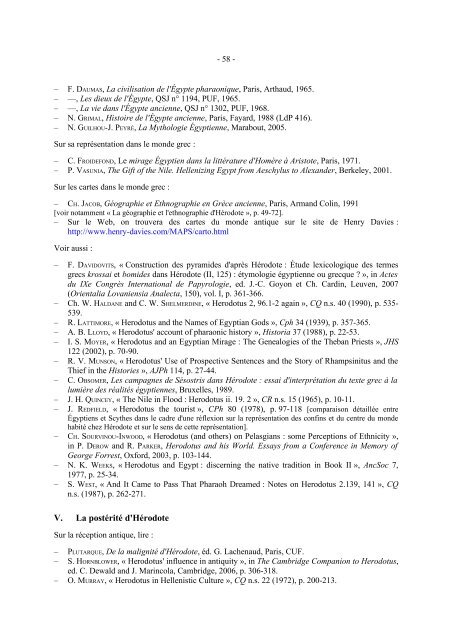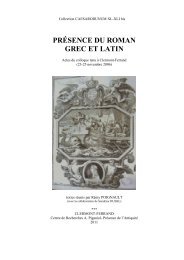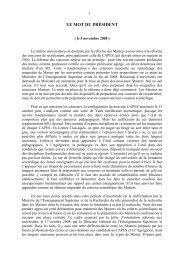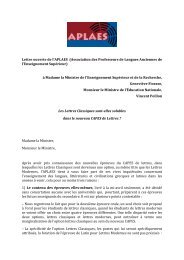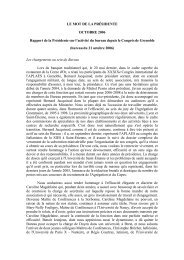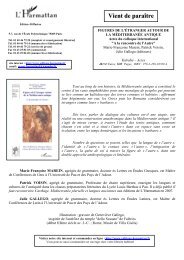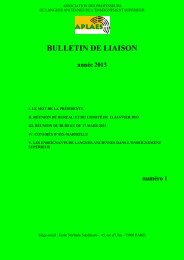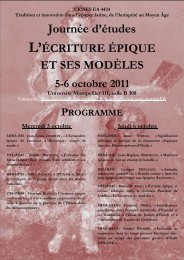Bulletin n° 2, année 2009 - APLAES
Bulletin n° 2, année 2009 - APLAES
Bulletin n° 2, année 2009 - APLAES
Create successful ePaper yourself
Turn your PDF publications into a flip-book with our unique Google optimized e-Paper software.
- 58 -<br />
– F. DAUMAS, La civilisation de l'Égypte pharaonique, Paris, Arthaud, 1965.<br />
– —, Les dieux de l'Égypte, QSJ n° 1194, PUF, 1965.<br />
– —, La vie dans l'Égypte ancienne, QSJ n° 1302, PUF, 1968.<br />
– N. GRIMAL, Histoire de l'Égypte ancienne, Paris, Fayard, 1988 (LdP 416).<br />
– N. GUILHOU-J. PEYRÉ, La Mythologie Égyptienne, Marabout, 2005.<br />
Sur sa représentation dans le monde grec :<br />
– C. FROIDEFOND, Le mirage Égyptien dans la littérature d'Homère à Aristote, Paris, 1971.<br />
– P. VASUNIA, The Gift of the Nile. Hellenizing Egypt from Aeschylus to Alexander, Berkeley, 2001.<br />
Sur les cartes dans le monde grec :<br />
– CH. JACOB, Géographie et Ethnographie en Grèce ancienne, Paris, Armand Colin, 1991<br />
[voir notamment « La géographie et l'ethnographie d'Hérodote », p. 49-72].<br />
– Sur le Web, on trouvera des cartes du monde antique sur le site de Henry Davies :<br />
http://www.henry-davies.com/MAPS/carto.html<br />
Voir aussi :<br />
– F. DAVIDOVITS, « Construction des pyramides d'après Hérodote : Étude lexicologique des termes<br />
grecs krossai et bomides dans Hérodote (II, 125) : étymologie égyptienne ou grecque ? », in Actes<br />
du IXe Congrès International de Papyrologie, ed. J.-C. Goyon et Ch. Cardin, Leuven, 2007<br />
(Orientalia Lovaniensia Analecta, 150), vol. I, p. 361-366.<br />
– Ch. W. HALDANE and C. W. SHELMERDINE, « Herodotus 2, 96.1-2 again », CQ n.s. 40 (1990), p. 535-<br />
539.<br />
– R. LATTIMORE, « Herodotus and the Names of Egyptian Gods », Cph 34 (1939), p. 357-365.<br />
– A. B. LLOYD, « Herodotus' account of pharaonic history », Historia 37 (1988), p. 22-53.<br />
– I. S. MOYER, « Herodotus and an Egyptian Mirage : The Genealogies of the Theban Priests », JHS<br />
122 (2002), p. 70-90.<br />
– R. V. MUNSON, « Herodotus' Use of Prospective Sentences and the Story of Rhampsinitus and the<br />
Thief in the Histories », AJPh 114, p. 27-44.<br />
– C. OBSOMER, Les campagnes de Sésostris dans Hérodote : essai d'interprétation du texte grec à la<br />
lumière des réalités égyptiennes, Bruxelles, 1989.<br />
– J. H. QUINCEY, « The Nile in Flood : Herodotus ii. 19. 2 », CR n.s. 15 (1965), p. 10-11.<br />
– J. REDFIELD, « Herodotus the tourist », CPh 80 (1978), p. 97-118 [comparaison détaillée entre<br />
Égyptiens et Scythes dans le cadre d'une réflexion sur la représentation des confins et du centre du monde<br />
habité chez Hérodote et sur le sens de cette représentation].<br />
– CH. SOURVINOU-INWOOD, « Herodotus (and others) on Pelasgians : some Perceptions of Ethnicity »,<br />
in P. DEROW and R. PARKER, Herodotus and his World. Essays from a Conference in Memory of<br />
George Forrest, Oxford, 2003, p. 103-144.<br />
– N. K. WEEKS, « Herodotus and Egypt : discerning the native tradition in Book II », AncSoc 7,<br />
1977, p. 25-34.<br />
– S. WEST, « And It Came to Pass That Pharaoh Dreamed : Notes on Herodotus 2.139, 141 », CQ<br />
n.s. (1987), p. 262-271.<br />
V. La postérité d'Hérodote<br />
Sur la réception antique, lire :<br />
– PLUTARQUE, De la malignité d'Hérodote, éd. G. Lachenaud, Paris, CUF.<br />
– S. HORNBLOWER, « Herodotus' influence in antiquity », in The Cambridge Companion to Herodotus,<br />
ed. C. Dewald and J. Marincola, Cambridge, 2006, p. 306-318.<br />
– O. MURRAY, « Herodotus in Hellenistic Culture », CQ n.s. 22 (1972), p. 200-213.


